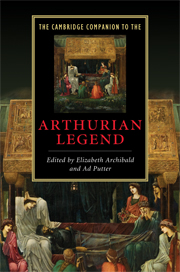9 - Arthurian ethics
from Part II - Themes
Published online by Cambridge University Press: 28 March 2010
Summary
My topic is Arthurian ethics in the plural, for no single idea of the 'good' governs all Arthurian works. 'Ethics', as I understand the term here, concerns reflection on the ways in which particular fields of moral criteria are constituted. Ethical literary criticism analyses the moral organisation of texts, assessing internal consistency, noting what is endorsed, condemned, obscured or omitted. It examines both any specific precepts encouraged by a work and the ways in which readers are directed towards those precepts. In one famous account of authorial moral guidance, Oscar Wilde's Miss Prism, questioned about the novel she has composed, declares, 'The good ended happily, and the bad unhappily. That is what Fiction means'. Apart from simplifying many comedies, Miss Prism's rule would outlaw tragedy - a genre in which the protagonist's punishment exceeds any crime or error committed - as well as many forms of satire; yet it is evident that characters' narrative fates are often morally charged. Works of ethical criticism are themselves inspired by different moral and critical principles which guide their investigation. Can we, then, speak of distinctively 'Arthurian ethics'? In the long tradition of Arthurian works, Arthur's court may be depicted as good or bad, and individual characters as better or worse than that court. No figure is condemned or idealised beyond recall. Moreover, Arthurian works, like all others, dialogue with the historical moments in which they were - and still are - produced and consumed; dialogue with non-Arthurian works also necessarily influences their varying moral orientations. Arthurian works are nevertheless significantly aware of themselves as Arthurian, belonging to a specific ancient and ongoing tradition.
- Type
- Chapter
- Information
- The Cambridge Companion to the Arthurian Legend , pp. 154 - 170Publisher: Cambridge University PressPrint publication year: 2009
- 1
- Cited by

